Editorial: Is the U.S. turning people away at the border who’ve been threatened with rape and murder?

The Department of Homeland Security has a protocol for handling undocumented migrants who show up at the border or at “ports of entry” such as Los Angeles International Airport. The first contact is U.S. Customs and Border Protection, whose agents question the migrants about why they want to enter the country. If the interview reveals a “credible fear” that the migrant would be persecuted if returned home, he or she is transferred to the U.S. Citizenship and Immigration Services, where an asylum officer determines whether the case is strong enough to send along to the immigration courts.
But a new report by Human Rights Watch raises some disturbing questions about whether border agents are treating migrants equally and respecting the protections spelled out in immigration law.
Based on an analysis of two years of immigration data and interviews with 35 Hondurans who sought entry to the U.S., the rights group found that border agents granted undocumented Hondurans access to an asylum officer in 1.9% of cases in 2011 and 2012. That was in line with rates for immigrants from El Salvador and Guatemala, similarly unstable and violent countries. But those rates were a sliver of the 21% of migrants from other countries who border agents found had a credible fear of persecution. Many of the Hondurans said their recounting of death threats and threats of rape or street gang conscriptions were ignored as they were summarily deported.
The report jibes with anecdotal evidence other immigrant rights groups have cited about abuses of the recently expedited deportation system, and suggests the government may be violating its own immigration laws as well as international codes on how asylum seekers must be treated.
Tangentially, the American Civil Liberties Union and other advocacy groups argue that the immigration courts’ recent “rocket docket” process improperly fast-tracks deportations of unaccompanied minors who surged across the border in the summer. The government hoped quick removals would help counter misperceptions in Honduras, Guatemala and El Salvador that children who made it to the U.S. border would be allowed to stay. But in the process, advocates say, the government is sending children back into dangerous conditions in their home countries in violation of U.S. and international law.
This is not how the immigration system is supposed to work. The government has the right to determine which noncitizens to allow into the country, but it must do so within the legal framework. The shortcuts must stop, and the human rights of all those who seek refuge must be respected.
Follow the Opinion section on Twitter @latimesopinion
More to Read
Start your day right
Sign up for Essential California for news, features and recommendations from the L.A. Times and beyond in your inbox six days a week.
You may occasionally receive promotional content from the Los Angeles Times.






